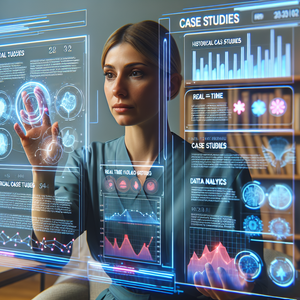The Intersection of Technology and Rehabilitation: How Innovations are Shaping Patient Care

Exoskeleton technology has made significant strides in recent years, offering hope and mobility to patients with severe mobility impairments. These wearable robotic devices are designed to assist individuals in standing and walking, thereby promoting physical rehabilitation and improving quality of life. For instance, companies like Ekso Bionics have developed exoskeletons that allow patients with spinal cord injuries to regain the ability to walk, providing not only physical benefits but also psychological improvements through increased independence. Clinical studies have shown that patients using exoskeletons during rehabilitation sessions experience enhanced muscle activation and improved cardiovascular health. A study published in The Journal of Rehabilitation Research & Development highlighted that participants using exoskeletons reported a significant increase in their ability to perform daily activities, contributing to a more fulfilling life. By integrating this technology into rehabilitation programs, therapists can create personalized plans that cater to individual patient needs, ultimately leading to better recovery outcomes.
Virtual Reality: A New Frontier in Therapy
Virtual reality (VR) is another groundbreaking tool making waves in PM&R. By immersing patients in a simulated environment, therapists can engage them in therapeutic exercises that feel less daunting and more enjoyable. For example, VR can be used for pain management, distraction during painful procedures, or rehabilitation following strokes and traumatic injuries. Research has demonstrated that VR can significantly enhance patient motivation and adherence to rehabilitation programs. A study published in the journal Neurorehabilitation and Neural Repair found that patients who participated in VR-based rehabilitation showed greater improvements in motor function compared to those receiving traditional therapy. By providing a dynamic and interactive platform, VR not only transforms the rehabilitation experience but also fosters a sense of achievement and progress among patients. Moreover, VR can simulate real-world scenarios, allowing patients to practice movements in a safe environment, thereby reducing the fear of falling or re-injury during rehabilitation.
AI-Driven Assessments: Personalizing Patient Care
Artificial intelligence (AI) is revolutionizing how healthcare providers assess and treat patients. In PM&R, AI-driven tools are being developed to analyze patient data, predict outcomes, and tailor rehabilitation plans more effectively. For instance, machine learning algorithms can process vast amounts of data from patient assessments to identify patterns and recommend personalized interventions. One notable application is the use of AI in gait analysis. By employing AI-assisted video analysis, therapists can gain deeper insights into a patient’s walking patterns, enabling them to create more precise and effective rehabilitation strategies. A study published in Physical Therapy evidenced that AI-driven gait analysis improved the accuracy of therapists' assessments, leading to more effective treatment plans. This data-driven approach not only enhances the effectiveness of treatments but also allows for real-time adjustments based on patient progress. Furthermore, AI can help in predicting potential complications or setbacks in the rehabilitation process, enabling healthcare providers to intervene proactively and adjust treatment plans accordingly.
The Integration of Technology in Holistic Care
While the technological advancements in PM&R are exciting, it is essential to remember that they should complement traditional rehabilitation practices rather than replace them. The integration of technology into rehabilitation must be guided by a holistic approach, considering the physical, emotional, and social aspects of patient recovery. Therapists play a crucial role in this integration, as they must navigate the balance between technology use and personal interaction. By leveraging technology while maintaining a strong therapeutic relationship with patients, healthcare providers can create a supportive environment that fosters healing and recovery. For instance, therapists can use technology to enhance their communication with patients, providing instant feedback and encouragement, which is vital for patient engagement and motivation.
The intersection of technology and rehabilitation is reshaping the landscape of physical medicine and rehabilitation in unprecedented ways. Innovations such as exoskeletons, virtual reality, and AI-driven assessments are not only enhancing patient care but also providing new avenues for recovery and rehabilitation. As these technologies continue to evolve, it is crucial for healthcare providers to embrace this change while ensuring that the patient remains at the heart of the rehabilitation process. By doing so, the future of PM&R holds the promise of more effective and compassionate care for individuals on their journey to recovery. In this rapidly changing field, the integration of technology and personalized patient care will be essential in achieving optimal rehabilitation outcomes, ensuring that every patient receives the support they need to regain their independence and improve their quality of life.
Rehabilitation Robotics Engineer
Ekso Bionics, ReWalk Robotics, and other assistive technology firms
Core Responsibilities
Design and develop robotic exoskeletons and assistive devices for patients with mobility impairments.
Collaborate with healthcare professionals to ensure that devices meet clinical needs and safety standards.
Conduct testing and validation of robotic systems, analyzing patient feedback and performance metrics.
Required Skills
Strong background in mechanical or biomedical engineering, with expertise in robotics.
Proficiency in CAD software and programming languages such as C++ or Python.
Familiarity with rehabilitation protocols and patient care practices.
Virtual Reality Rehabilitation Specialist
Companies specializing in health tech and VR solutions, such as MindMaze and AppliedVR
Core Responsibilities
Develop and implement virtual reality programs tailored for rehabilitation therapy.
Monitor patient progress and adjust VR exercises based on individual needs and therapy goals.
Train and support therapists in utilizing VR technology effectively within their treatment plans.
Required Skills
Experience in physical therapy or occupational therapy, with a focus on innovative therapeutic methods.
Knowledge of VR development platforms (e.g., Unity, Unreal Engine) and user experience design.
Strong communication skills to convey technical information to healthcare professionals.
AI Data Analyst in Rehabilitation
Healthcare analytics firms, AI startups specializing in rehabilitation, and large hospital systems
Core Responsibilities
Analyze patient data using AI-driven tools to identify patterns and predict rehabilitation outcomes.
Collaborate with therapists to develop personalized treatment plans based on data insights.
Create reports and visualizations to communicate findings to clinical teams and stakeholders.
Required Skills
Proficiency in data analysis tools (e.g., Python, R, SQL) and machine learning algorithms.
Understanding of rehabilitation metrics and patient assessment methods.
Strong problem-solving skills and ability to work collaboratively in a clinical setting.
Clinical Research Coordinator for Rehabilitation Technologies
Research institutions, universities, and hospitals conducting innovative PM&R studies
Core Responsibilities
Manage clinical trials evaluating new rehabilitation technologies, including exoskeletons and VR therapies.
Recruit and interact with study participants, ensuring compliance with ethical guidelines and research protocols.
Analyze trial data and assist in the publication of research findings in scientific journals.
Required Skills
Background in clinical research methodologies and ethics, preferably within a healthcare context.
Strong organizational skills and attention to detail for managing multiple studies.
Excellent communication skills to liaise with medical teams and regulatory bodies.
Physical Therapist with Technology Integration Expertise
Rehabilitation clinics, hospitals, and outpatient therapy centers focusing on innovative patient care solutions
Core Responsibilities
Provide hands-on rehabilitation therapy while incorporating advanced technologies such as exoskeletons and VR.
Assess patient needs and develop individualized treatment plans that utilize technological tools.
Educate patients and their families about the role of technology in the rehabilitation process.
Required Skills
Licensed physical therapist with specialized training in technology-enhanced rehabilitation.
Experience with assistive devices and virtual reality applications in therapy.
Strong interpersonal skills to foster patient engagement and motivation during treatment.


